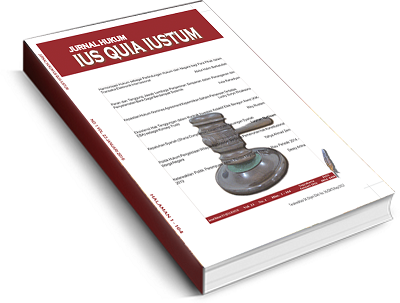Main Article Content
Abstract
Keywords
Article Details
Authors who publish with this journal agree to the following terms:
a. Authors retain copyright and grant the journal right of first publication with the work simultaneously licensed under a Creative Commons Attribution License that allows others to share the work with an acknowledgement of the work's authorship and initial publication in this journal.
b. Authors are able to enter into separate, additional contractual arrangements for the non-exclusive distribution of the journal's published version of the work (e.g., post it to an institutional repository or publish it in a book), with an acknowledgement of its initial publication in this journal.
References
- Buku
- Badan Standardisasi Nasional, Pengantar Standardisasi, Edisi Pertama, Jakarta, 2009.
- Badan Standardisasi Nasional, Strategi Standardisasi Nasional 2015 – 2025, Jakarta, 2013.
- Shofie, Yusuf, Perlindungan Konsumen dan Instrumen-instrumen Hukumnya, Citra Aditya Bakti, Bandung, 2003.
- Soemitro, Ronny Hanitijo, Metodologi Penelitian Hukum dan Jurimetri, Ghalia Indonesia, Jakarta, 1990.
- Soekanto, Soerjono dan Sri Mamudji, Penelitian Hukum Normatif suatu Tinjauan Singkat, Rajawali, Jakarta, 2006.
- Sumadi, Metode Penelitian, CV Rajawali, Jakarta, 1988.
- Sumardjono, Maria S.W., Pedoman Pembuatan Usulan Penelitian, Yogyakarta, Fakultas Hukum Universitas Gadjah Mada, 1989.
- Syawali, Husni dan Neni Sri Imaniyati, Hukum Perlindungan Konsumen, Mandar Maju, Bandung, 2000.
- Wilson, John S., Standard Regulation and Trade (WTO Rules and Developing Country Concern), Development Trade and The WTO: A Hand Book, World Bank, Washington DC, 2002.
- Artikel, Jurnal
- Editorial, “Special Report: Kontribusi Standardisasi Terhadap Ekonomi”, Majalah SNI Valuasi Vol. 3 No. 2 Tahun 2009, Badan Standardisasi Nasional.
- Hamanaka, Shintaro and Sufian Jusoh, “The Emerging ASEAN Approach to Mutual Recognition”, Institute of Developing Economies, JETRO, Chiba University 2016.
- Ledda, Veredigna M., “AEC 2015:Issues and Challenges in Standards and Conformance”, Phillipine Journal of Development, Number 71 Vol XXXIX No. 1 & 2, 2012
- Scoles, Samuel D., “Harmonization Of Standards And Mutual Recognition Agreement On Conformity Assessment Inindonesia, Malaysia, Thailand And Vietnam”, ERIA Research Project Report 2015 No. 15, November 2015
- Shimizu, Kazushi, “The ASEAN Charter and the ASEAN Economic Community” Economic Journal of Hokkaido University, Vol. 40, 2011.
- Sim, Edmund W, “The Outsourcing of Legal Norms and Institutions by the ASEAN Economic Community”, The Indonesian Journal of International and Comparative Law, Vol 1 Issue 1, Januari 2014.
- Romprasert, Suppanunta, “Asian Economic Community with Selected Macroeconomic Variables for Exports Sustainability,” International Journal of Economics and Financial Issues, Vol. 3, No. 3, 2013.
- Peraturan Perundang-Undangan
- Undang-Undang Dasar Negara Republik Indonesia Tahun 1945
- Undang-Undang Nomor 20 Tahun 2014 tentang Standardisasi dan Penilaian Kesesuaian (Tambahan Lembaran Negara Republik Indonesia Nomor 5584)
- Peraturan Pemerintah No. 102 Tahun 2000 tentang Standardisasi Nasional (Tambahan Lembaran Negara Republik Indonesia Nomor 4020)
- Internet
- WTO TBT Agreement “Code of Good Practice”, Agreement on Technical Barriers to Trade, https://www.wto.org/english/docs_e/legal_e/17-tbt_e.htm#annexIII diakses pada tanggal 15 Januari 2018.
References
Buku
Badan Standardisasi Nasional, Pengantar Standardisasi, Edisi Pertama, Jakarta, 2009.
Badan Standardisasi Nasional, Strategi Standardisasi Nasional 2015 – 2025, Jakarta, 2013.
Shofie, Yusuf, Perlindungan Konsumen dan Instrumen-instrumen Hukumnya, Citra Aditya Bakti, Bandung, 2003.
Soemitro, Ronny Hanitijo, Metodologi Penelitian Hukum dan Jurimetri, Ghalia Indonesia, Jakarta, 1990.
Soekanto, Soerjono dan Sri Mamudji, Penelitian Hukum Normatif suatu Tinjauan Singkat, Rajawali, Jakarta, 2006.
Sumadi, Metode Penelitian, CV Rajawali, Jakarta, 1988.
Sumardjono, Maria S.W., Pedoman Pembuatan Usulan Penelitian, Yogyakarta, Fakultas Hukum Universitas Gadjah Mada, 1989.
Syawali, Husni dan Neni Sri Imaniyati, Hukum Perlindungan Konsumen, Mandar Maju, Bandung, 2000.
Wilson, John S., Standard Regulation and Trade (WTO Rules and Developing Country Concern), Development Trade and The WTO: A Hand Book, World Bank, Washington DC, 2002.
Artikel, Jurnal
Editorial, “Special Report: Kontribusi Standardisasi Terhadap Ekonomi”, Majalah SNI Valuasi Vol. 3 No. 2 Tahun 2009, Badan Standardisasi Nasional.
Hamanaka, Shintaro and Sufian Jusoh, “The Emerging ASEAN Approach to Mutual Recognition”, Institute of Developing Economies, JETRO, Chiba University 2016.
Ledda, Veredigna M., “AEC 2015:Issues and Challenges in Standards and Conformance”, Phillipine Journal of Development, Number 71 Vol XXXIX No. 1 & 2, 2012
Scoles, Samuel D., “Harmonization Of Standards And Mutual Recognition Agreement On Conformity Assessment Inindonesia, Malaysia, Thailand And Vietnam”, ERIA Research Project Report 2015 No. 15, November 2015
Shimizu, Kazushi, “The ASEAN Charter and the ASEAN Economic Community” Economic Journal of Hokkaido University, Vol. 40, 2011.
Sim, Edmund W, “The Outsourcing of Legal Norms and Institutions by the ASEAN Economic Community”, The Indonesian Journal of International and Comparative Law, Vol 1 Issue 1, Januari 2014.
Romprasert, Suppanunta, “Asian Economic Community with Selected Macroeconomic Variables for Exports Sustainability,” International Journal of Economics and Financial Issues, Vol. 3, No. 3, 2013.
Peraturan Perundang-Undangan
Undang-Undang Dasar Negara Republik Indonesia Tahun 1945
Undang-Undang Nomor 20 Tahun 2014 tentang Standardisasi dan Penilaian Kesesuaian (Tambahan Lembaran Negara Republik Indonesia Nomor 5584)
Peraturan Pemerintah No. 102 Tahun 2000 tentang Standardisasi Nasional (Tambahan Lembaran Negara Republik Indonesia Nomor 4020)
Internet
WTO TBT Agreement “Code of Good Practice”, Agreement on Technical Barriers to Trade, https://www.wto.org/english/docs_e/legal_e/17-tbt_e.htm#annexIII diakses pada tanggal 15 Januari 2018.




